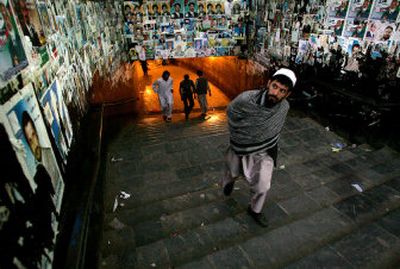Afghans vote despite violence

KABUL, Afghanistan – Afghans braved an outbreak of violence today to vote in landmark legislative elections, hoping to strengthen a fragile democracy after decades of war and sideline the Taliban militants who fought to undermine the polling.
Two rockets hit a U.N. warehouse in the Afghan capital, wounding a local staff member, while fierce fighting erupted in eastern Afghanistan hours before the vote that left three militants and two policemen dead and two U.S. troops wounded, officials said.
U.N. and U.S. officials predicted a massive turnout despite a Taliban call for a boycott of the elections.
President Hamid Karzai cast his ballot, telling reporters: “We are making history.”
“It’s the day of self-determination for the Afghan people,” he said. “After 30 years of wars, interventions, occupations and misery, today Afghanistan is moving forward, making an economy, making political institutions.”
Some 12.4 million Afghans were registered to vote at more than 6,000 polling stations, guarded by some 100,000 Afghan police and soldiers and 30,000 foreign troops.
The Taliban said they would not attack civilians heading to the polls but warned them to stay away from areas where the militants might attack security forces.
But a wave of assaults in the 48 hours leading up to the vote left 13 militants and five policemen dead and two American troops injured. Security forces said they thwarted four rebel bombings, including an attempt to blow up a massive dam.
The vote was seen as the last formal step toward democracy on a path set out after a U.S.-led force drove the Taliban from power in 2001, when they refused to hand over al-Qaida leader Osama bin Laden following the Sept. 11 attacks.
Many people hoped the legislative polls would marginalize the insurgents and end a spiral of violence that started in 1979 when Soviet troops invaded, before a devastating civil war and the oppressive rule of the hard-line Taliban.
“Today is a magnificent day for Afghanistan,” said Ali Safar, 62, who was standing in line to vote in the capital, Kabul. “We want dignity, we want stability and peace. Thirty years of war and poverty is enough.”
In the latest violence, dozens of suspected Taliban rebels attacked a police checkpoint in Khost province, on the border with Pakistan, triggering a three-hour gunbattle, said local police chief Gen. Mohammed Hayub Hashini.
He said the militants came across the mountainous border from Pakistan before launching the attack. Three militants and two policemen were killed and two U.S. troops wounded, he said.
Suspected Taliban also attacked a polling station in southern Helmand province, triggering a gunbattle that left one militant dead, local Gov. Sher Mohammed Aghunzada said. Rebels in eastern Nangahar province threw a grenade into a candidate’s home, wounding five of his family members, officials said.
Chief election organizer Bismillah Bismil was one of the first to vote in Kabul. Afterward, he urged his Afghan “brothers and sisters to come out today and cast their ballots,” reassuring them that their vote would be secret.
Top U.N. envoy Jean Arnault said militants had failed to disrupt preparations for the polls despite violence during the six months leading up to the vote that killed 1,200 people, including seven candidates and four election workers.
“We are very confident that those extremists will also fail to disrupt and derail voting day,” Arnault said.
A U.S. military spokesman, Col. James Yonts, predicted “a massive number” of voters would turn out, telling the Associated Press that “this election will send a powerful message to the Taliban that their influence is waning.”
About 100,000 Afghan police and soldiers and 30,000 foreign troops were on alert to guard the election. In Kandahar, the former Taliban stronghold, all vehicles were banned from driving after midday Saturday due to car bomb fears.
In Pakistan, thousands of soldiers stood by near the border with Afghanistan. Militants based on the Pakistani side of the mountainous frontier are believed to cross into Afghanistan to stage attacks.
Amid the violence and concerns about voters being pressured by local warlords, the chairman of the Afghan-U.N. electoral body, Bismillah Bismil, assured voters their ballots would be secret.
“Do not be intimidated or frightened by the empty threats of those who attempt to influence your vote,” he said.
Arnault, the U.N. envoy, hailed the election as a victory over violence.
“We are seeing today an unmistakable confirmation that there is in the country the emergence of a new political culture,” he said. “A sense that the legacy of the rule of the gun can be resisted is now taking root.”